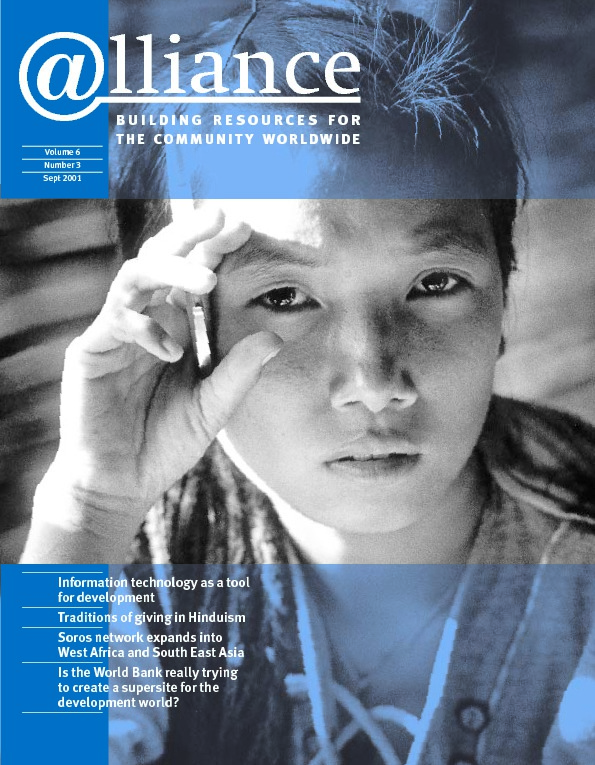In 1997 a Labour government was elected in the UK and a new Department for International Development (DFID) established. This heralded a new era of hope for the international NGO community. Now the Labour government has just been re-elected for a further term: what changes has DFID actually made in the last four years, and how have relations between DFID and NGOs developed?
One thing DFID did was create a special Civil Society Department (CSD). This primarily manages the Civil Society Challenge Fund (CSCF), now the main funding line for all international NGOs and wider civil society. While it has a continued focus on poverty, the new fund emphasizes rights-based approaches to development and innovative initiatives that empower poor people to advocate for the realization of their rights.
This approach reflects the movement of many NGOs away from service delivery towards advocacy. However, some feel it overly prescribes DFID’s development agenda to NGOs. This puts NGOs at risk of being co-opted by donor agendas rather than driven by the demands and needs of the poor – especially against a backdrop of tighter financial constraints for NGOs in terms of statutory donors and public giving.
Development education, to increase information flow and interest in issues in developing countries within the UK, was also given a higher priority. Opportunities for NGOs to receive strategic funds were opened up with the introduction of Programme Partnership Agreements (PPAs), which replace project-by-project funding, but only for a few very large NGOs.
Consultations galore
One of the first things the new department did was to usher in a much-publicized White Paper called ‘Eliminating World Poverty – A Challenge for the 21st Century’. This placed the DAC international development targets (IDTs) at the centre of the British Government’s international development agenda.[1] These targets have been very useful as a way of mobilizing government into action and generating resources. The British Government has since reversed the trend of cutting its aid budgets, and DFID has been using them to lobby the European Commission to adopt a clearer poverty focus.
The first White Paper was followed by a huge number of publications, the most important being nine papers outlining strategies for achieving the IDTs – on urban issues, water, primary education, health, economic growth, environment, women, human rights and governance. The process of consultation with NGOs on these papers was patchy. Many NGOs did not hear about the process until it was completed. Response time was often extremely short, stretching NGOs’ resources if they were to feed back effectively and making it almost impossible to include southern partners in the discussion. There was a growing feeling that NGOs were being used to legitimize a government process rather than to provide valuable input.
Towards the end of the first four-year term, DFID ushered through a more controversial White Paper, ‘Making Globalization Work for the Poor’. The consultation on this paper was very brief and there was little time for meaningful dialogue between DFID and NGOs.
Greater NGO coordination
While DFID needs to be more transparent and engage more openly with civil society, NGOs also need to coordinate their responses more effectively and collaborate in practical areas of work. Certainly, Secretary of State Clare Short has been very outspoken about the lack of NGO coordination. This does not mean that NGOs should be going for mergers and takeover bids – diversity in terms of size, approach and focus allows for creative thinking and makes it more likely that organizations will be able to respond to a myriad of individual and community needs. However, smaller NGOs have expressed concern that DFID would like to lower its transaction costs by reducing the number of agencies that it engages with.
From rhetoric to reality
The IDTs are still a long way off being met. If DFID and NGOs could work together on areas of mutual interest such as the cancellation of third world debt, lobbying the treasury for more funds to ensure government targets are met, and lobbying the EU for a greater poverty focus, they might make more progress in achieving their common goal of eradicating poverty. Effective and positive engagement with the media to encourage greater publicity for complex development issues and more engagement of the public with them could be another area for fruitful collaboration.
Continued engagement between DFID and NGOs on strategic policy issues is also needed, plus more transparent consultation processes (including mechanisms to deal with disagreements and coordinate NGO responses). The fact that NGOs, northern and southern, are increasingly being called upon to consult with government and donors on development issues provides a valuable entry point for civil society to influence policy-making. However, if the participation process is not meaningful and transparent there is a danger that scepticism will grow and NGOs will begin to suffer from ‘consultation fatigue’.
1 The best known of these is to reduce by one half the proportion of people living in extreme poverty by 2015.
Catherine Gunby is Programme Funding Officer at HelpAge International. She can be contacted by email at cgunby@helpage.org
New website tracks progress on International Development Goals
Visit the new http://www.developmentgoals.org website for the latest data on country and regional progress towards the International Development Goals.





Comments (0)